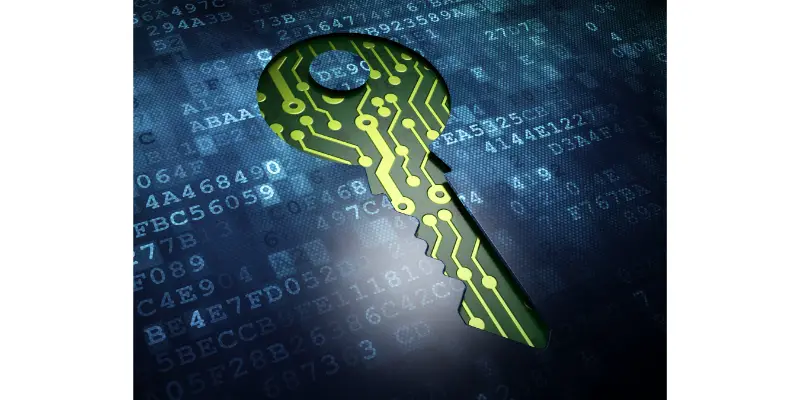Disclaimer: This post may contain affiliate links, meaning we get a small commission if you make a purchase through our links, at no cost to you. For more information, please visit our Disclaimer Page.
Passwords and PINs serve the same purpose. That is, to protect your data from unauthorized access. At a glance, the difference between the two is that the passwords can have several characters, while PINs are restricted to numbers. But then, the question remains, which is more secure; is it Pin or Password?
Passwords are more secure because they use more characters than PINs. Users can set passwords with as many as 95 characters while PIN codes only need 10 digits. As a result, passwords are much more difficult to guess than PIN codes. Nonetheless, each has its own area of strength.
The goal of this article is to help you understand how these two authentication methods differ. I will also help you see where you can use them to secure your devices and accounts. The security of your devices and accounts is a big issue. Thus, you should read this with rapt attention.
Table of Contents
Are PINs secure?
PINs offer a level of security depending on what they are used for. PIN is the short form of Personal Information number. It usually consists of between four and eight numbers. These numbers help users prevent unauthorized access to their data.
Invented by John Shepard-Barron, the Pin system was first used with cash machines in the 1960s. John at the time wanted to secure cash transactions. Then his wife suggested the 4-digit system that the UK used at the time. Ever since the PIN system has remained very popular.
There seems to be only one issue with the PIN system which is its limited use of characters. To set up a PIN, you can only use numbers between 0 and 9. That means, for a PIN with 4 numbers, there are only 10,000 possible combinations.
That is to say that if someone were to guess a 4-digit pin, he has one chance in 10,000 to guess correctly. This however becomes a problem if the person trying to guess decides to use brute force. Brute force is a trial-and-error method of guessing passwords.
To address this problem, security experts use a PIN on devices that allow manual data entry. So, while 10,000 entries might seem easy to crack, you will have to do it without Brute Force. That’s because most systems that use PINs only allow users a specified number of attempts. Once the user fails to enter the correct PIN after some attempts, the device becomes disabled.
This added layer of security makes it even harder to crack PINs. For instance, if you use a 4-digit pin with only 6 attempts. The probability of someone guessing your PIN is about 0.06%. However, using very simple PINs like 000, 5555, 1234 gives it a higher probability of being guessed.
Is password secure?
A password is secure when you create one the right way. You can consider a password as secure if it has a variety of characters in it. That is numbers, letters (upper and lower cases), and special characters. A good password can also be a phrase that has some words in it that meet these requirements.
Fernando Corbato, along with some others from MIT invented passwords in 1961. Ever since it has been an alternative to securing data alongside PINs.
Unlike PINs, passwords allow users to use a combination of characters. That way, there are several possible combinations. For instance, a password with 10 characters will have about 59,873,693,923,837,900,000 combinations. Mathematically speaking, the number of possibilities makes it look secure. Yet, in reality, a lot of other variables come into play in terms of security.
The problem with passwords is that they usually do not have restrictions to trials. That means, even with the difficulty in guessing the passwords, hackers can gain access to these systems using automated brute-force attacks.
It is worthy to note that brute force loses practicality when the password is complex. You can protect yourself from brute force attacks by adding 2-factor authentication to your passwords.
Is there a difference between PIN and password?
PIN and password differ in so many ways. From afar, they might seem similar but in reality, they serve different purposes. Understanding the difference between these two is particularly important these days that we see marketers use the word “passwordless authentication.”
Marketers try to sell the idea that you do not need to memorize anything for authentication. But in reality, you discover that a pin remains an option for security.
The most obvious difference between passwords and PINs is the characters they use.
PINs can only use numbers. Passwords can however contain a mixture of numbers, letters, and special characters.
That means PINs are easier to remember. Also, they are easier to type than passwords. You have very few options and the buttons are larger when you are entering your PIN. As a result, most devices that use PIN codes, allow a limited number of trials.
For instance, android and iPhones only allow you to try your pin 10 times. After 10 failed attempts before it locks you out for 30 seconds. After that, the wait time continues to increase after each failed attempt. In the end, it will take you up to 3 hours to try 20 incorrect pin combinations. These phones also have an option that wipes the phone’s memory after several failed attempts.
Password authentication does not have anti-hammering features that are present in PIN authentication. This is because passwords can be complex to remember. The use of extra characters and the length makes them difficult for users to remember.
Also, the process of entering them will involve several buttons. This creates a big problem for many users especially those with touch screen devices. As a result, passwords generally have an unlimited number of trials. In some cases, they might even have clues for their users.
Because users can easily remember their PINs, PINs are FIDO-approved. Passwords on the other hand are not. FIDO is the short form for Fast ID Online. It is a set of technology security specifications for strong authentication.
Beyond the obvious, passwords and PINs serve different purposes. PIN codes work with local authentication while passwords work with remote authentication. That is, PIN codes protect unauthorized access into devices while Passwords protect online resources on the internet.
This is because online resources are usually more prone to hacking than local devices. Thus, you need the highest possible level of protection for your online accounts.
This is why online accounts that need remote access use passwords for authentication.
Local devices that you interact with daily do not need so much complicated security. A good example is your phone. To access your phone, one needs to have the phone in their hands. Except your device is stolen, the authentication is there to prevent people from gaining access immediately after they hold your phone.
A good way to explain this is with Windows 10. If you have a cloud-based account, Windows will require you to set a complex password for such an account. That is because a cloud-based account has remote access. Anyone can access your data from the cloud with a cloud-based account. Hence the need for extra caution.
At the same time, you also have the opportunity to set a PIN. The PIN allows you to conveniently enter your device any time you want. The PIN stays on your local computer and has nothing to do with the internet.
Should anyone try to get into your computer through the PIN, they have to hold your computer in their hands. Chances are that while they are trying to guess the code, they either run out of trials or you meet them in the process.
Which are more secure passwords or PINs?
Passwords are more secure than PINs. Before you go any further, I must say that there are no such things as secure authentication methods. Whether PIN or password, both have their risk factors.
Statistically, passwords are safer when you do the calculations. There are only 10 options to use for each character of your pin; that is numbers 0-9. Passwords however can have as many as 95 options. That is if you consider all characters on a regular keyboard plus the space button.
The more options you have for each character, the more difficult it is to crack the password. For a 10-digit pin, there are 10,000,000,000 possible characters. However, a 10-character password has 59,873,693,923,837,900,000 possible characters.
If you divide that number by the world’s population. You get about 8 billion possible passwords for everyone living today. Plus, a 10-digit pin is not realistic as it is too long. However, a password with 10 characters is still on the short side of things.
Security experts also say that the length of your authentication will determine how long it would take to crack it. With the right tools, a hacker would need about 10 seconds to crack a 5-digit pin. However, it would take up to 3,000 years to crack a 10-character password. That means, it is impossible for people to access your data when you secure it with strong passwords.
The only problem that passwords have is that they are susceptible to brute force attacks. Because passwords are difficult to remember, they allow as many trials as possible. This means hackers can try as many times as they wish when trying to gain entry.
Due to growing concerns on security, password-protected accounts and devices now use 2-factor authentication. This helps to bridge the gap that exists as a result of the absence of the anti-hammering feature that pins have.
With two-factor authentication(2-FA), a user will get a message on another device whenever anyone tries to access one of his accounts from anywhere. That way, the user can block such persons out and take actions like changing his password.
What should you use passwords or PINs?
The answer to this depends on what you need to secure.
If you aim to secure a touch screen device like your phone, I would recommend you use a PIN. That’s because it is safe and easy to remember. You can also use PINs to secure your PC if you are not using a cloud account on it. A pin will prevent unauthorized entry when you leave your device with people. At the same time, it would allow you easy access to your device without exceeding the attempt limit.
But, if you want to secure something more important like an online account or a work computer, a password is more reliable. That’s because of the mathematics of more combinations available for password combinations.
When using a password especially with cloud-based accounts, ensure that you enable multi-factor authentication (2FA). This will help you create an extra layer of security. It will also reduce the possibility of successful automated brute force attacks.
Conclusion
Passwords are more secure than PINs when you consider the mathematics behind them. However, both methods serve different purposes. Passwords are perfect when you use them in securing online accounts and devices that need remote access. On the other hand, PINs can secure devices that require local access.
Whichever one you use, ensure that you take some extra efforts to secure your data. Make sure you use two-factor authentication with your accounts. Also, ensure that you do not disclose your pins or passwords to anyone you do not trust.



